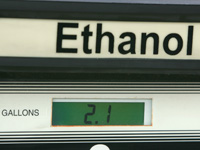New Energy Funding Will Advance Ag Research in Biofuels, Energy Efficiency
New Energy Funding Will Advance Ag Research in Biofuels, Energy Efficiency

Published on March 8, 2006
New funding for energy research announced by Governor Ernie Fletcher will benefit Kentucky agriculture as well as the environment.
Seven grants from the Kentucky Office of Energy Policy (KOEP) totaling $295,000 combined with $1.13 million in federal matching funds from the Kentucky Rural Energy Consortium (KREC) will enable researchers at the University of Kentucky and University of Louisville to conduct several projects related to ethanol production.
“In his State of the Union Address and in the Advance Energy Initiative, President Bush clearly states that America must reduce its dependence on foreign sources of energy,” said Governor Fletcher. “Through this investment, we are positioning Kentucky and our research universities to play a vital role in meeting the President’s energy goals.”
One of the seven projects will develop an ethanol pilot facility to evaluate the effect of collection, storage and pretreatment of corn stalks.
“The objective will be to increase the value of corn stover (stalks) as a sugar feedstock used for ethanol production, and this could add value to corn crops grown by Kentucky producers,” said Rich Gates, chair of UK’s Biosystems and Agricultural Engineering department in the College of Agriculture.
Another project receiving funding will investigate novel concepts for biological reactors that can convert biomass, such as corn stover or wood waste, into bio-based oil and fuel.
“The global economy is poised for a move from petroleum based to bio-based energy and this project is one of a number of innovative national and international efforts to advance science in this area,” said Wendy Baldwin, UK Executive Vice President for Research. “Our partnership with the University of Louisville’s Kentucky Pollution Prevention Center is fostering the type of collaboration needed for renewable energy research to move forward more rapidly.”
One of the projects will investigate an economical way to produce biomass briquettes for industrial boilers using corn stover, fescue and wood waste. Another will study a process to adapt bacteria to improve ethanol production.
“Bioprocessing is one of the agricultural initiatives that the Commonwealth has identified for development in the Kentucky Innovations Act program and features heavily in both the Kentucky Energy Policy and the National Energy Bill,” said Nancy Cox, associate dean for research in the College of Agriculture. “Our college has long been a leader in energy-related research, but this funding puts us one step closer to reaching some long-term goals.”
A project to develop a residential ventilation system that reduces energy consumption also will improve indoor air quality. The goal is to develop a weather response ventilation system (WRV) to automatically vary incoming air flow rate depending on outdoor weather conditions. Other projects include development of sub-microscopic materials called “nanomaterials” to produce electricity and hydrogen from water and the sun, and an investigation of a solar heating system specific to Kentucky’s climate.
“This important funding for UK and the University of Louisville provides an opportunity to meet the needs of the public and our agricultural producers just when energy costs are beginning to rise,” said Larry Turner, associate dean for Cooperative Extension in the College of Agriculture.
KREC’s funding was secured by Senator Mitch McConnell and Senator Jim Bunning through a federal appropriation to the University of Louisville that established and organized KREC in collaboration with UK and KOEP. The Kentucky Pollution Prevention Center at U of L’s J.B. Speed School of Engineering serves as KREC’s clearinghouse and provides support for ongoing activities of consortium members, as well as state and federal programs that support KREC’s goals.
“One of the roles of Cooperative Extension is to deliver research-based information on energy efficiency and renewable technologies to all Kentuckians, and of course we couldn’t do it without our many partner agencies and organizations in the state,” said Turner.
Partners include the Governor’s Office of Agricultural Policy, Kentucky Office of Energy Policy, Kentucky Environmental and Public Protection Cabinet, Kentucky Commerce Cabinet, Kentucky Department of Agriculture, Kentucky Pollution Prevention Center, Kentucky Farm Bureau, Kentucky Corn Grower’s Association, Kentucky Soybean Council, Kentucky Clean Fuels Coalition, Distillers Grains Technologies Council, Kentucky Poultry Federation, Kentucky Pork Producers, Kentucky Horticulture Council, Kentucky League of Cities, Kentucky National Energy Education Development Project, Kentucky Association of Electric Cooperatives, Kentucky Center for Cooperative Development, East Kentucky Power Cooperative, Marathon Ashland, Griffin Industries, and Kentuckiana Greenhouse Association.
More information on energy-related programs in the College of Agriculture can be found at: http://ces.ca.uky.edu/energy/index.htm andhttp://www.bae.uky.edu/energy/ .